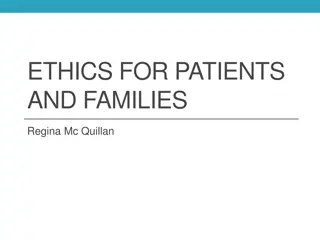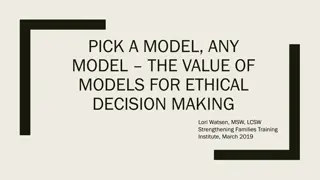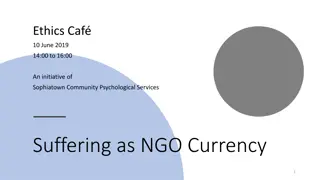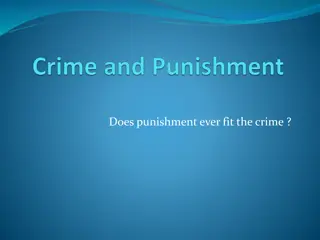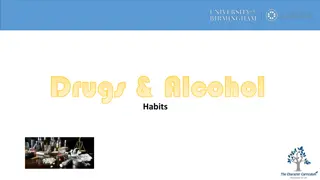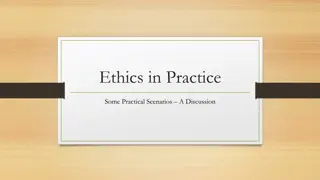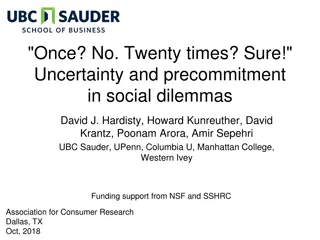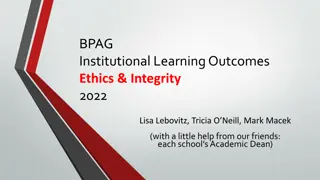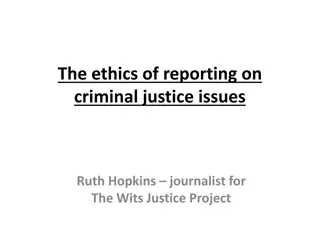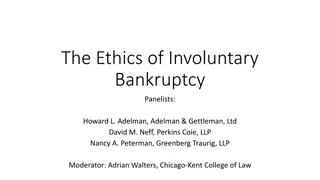Ethical Dilemmas and Justice Scenarios Examined
Explore various moral dilemmas and justice-related scenarios presented in thought-provoking situations such as saving a drowning boy, the plank of Carneades, a pregnant woman facing imminent danger, and a philosophical debate on justice theories. Delve into questions of moral obligations, legal implications, and different perspectives on justice.
Download Presentation

Please find below an Image/Link to download the presentation.
The content on the website is provided AS IS for your information and personal use only. It may not be sold, licensed, or shared on other websites without obtaining consent from the author. Download presentation by click this link. If you encounter any issues during the download, it is possible that the publisher has removed the file from their server.
E N D
Presentation Transcript
Harvard Lecture on Justice by Michael Sandel http://www.youtube.com/watch?v=kBdfcR- 8hEY
The Swimmer Roger Smith, a quite competent swimmer, is out for a leisurely stroll. During the course of his walk he passes by a deserted pier from which a teenage boy who apparently cannot swim has fallen into the water. The boy is screaming for help. Smith recognizes that there is absolutely no danger to himself if he jumps in to save the boy; he could easily succeed if he tried. Nevertheless, he chooses to ignore the boy's cries. Does Smith have a moral obligation to save the boy? If so, should he have a legal obligation as well?
The Plank of Carneades Two sailors are the only survivors of a shipwreck. They re swimming and both see a plank floating in the sea. The first sailor reaches it and gets on top. The second sailor swims over and pushes the first sailor off which causes him to drown. The second sailor is later picked up by a rescue team. Did the second sailor commit murder?
The Pregnant Woman and Impending Doom A pregnant woman with a group of people is urged by the others to go first when leaving a cave on the coast. She gets stuck in the mouth of that cave. In a short time high tide will be upon them, and unless she is unstuck, they will all be drowned except the woman, whose head is out of the cave. But, fortunately, or unfortunately, someone has with him a stick of dynamite. There seems no way to get the woman loose without using that dynamite which will inevitably kill her; but if they do not use it everyone will drown. What should they do? If they use the dynamite, will they be guilty of murder?
Amartya Sens Flute Three children, Anne, Bob and Carla, are arguing about who should receive a flute. The arguments they give for getting the flute are not selfish, partial or arbitrary, but based on different theories of justice. Of course, since they are children, they don t have a well-developed sense of the theories of justice they each adopt and use as a justification for getting the flute, but it turns out that the three of them present a crude version of three of the most common philosophical theories of justice. Anne claims that she should get the flute because she s the only one of the three children who know how to play it (which is correct). It would, in her view, be unjust to deny the flute to the only one who can make proper use of it. Bob claims that the flute should be his because he s poor and doesn t have anything to play with (which is correct). He could possibly even learn how to play it given the opportunity. It would be unjust to deprive him of this opportunity and to leave him destitute compared to the other children. Carla claims the flute should be hers because she spent a lot of time making it (which is correct). Taking the flute away from her would be unjust.
All three points of view or theories of justice if you want sound persuasive, although some will sound more persuasive to some than to others. In fact, if you re a utilitarian, you ll be more persuaded by Anne. If you re a liberal egalitarian, Bob will have your ear. And if you re a libertarian, Carla will be the obvious choice. A utilitarian will argue that giving the flute to Anne will produce the highest aggregate utility (or happiness or whatever). After all, it s better to play the flute than just play with it , or simply make it. Even the negative utility for Bob and Carla i.e. not having the flute would perhaps not outweigh the positive utility for Anne. And even Bob and Carla can get some utility from the fact that Anne has the flute: they may enjoy her playing it. Liberal egalitarians would point to the fact that Anne s ability to play the flute the reason for utilitarians to give her the flute is perhaps the result of a privileged social position. This is also possibly why Carla was able to make the flute. Giving the flute to Bob would equalize society, and that is what justice is about for them, not property rights or utility. Libertarians would strongly support the property rights of Carla, rights which for them override utility considerations.
Equity in Education Which version is fair ?
Kohlberg Dilemma In a far away country, a woman was very, very sick. There was some medicine that would make her all better, but the woman s husband didn t have enough money to buy the medicine. The man tried to borrow all the money he could, but he didn t have enough. He asked the doctor if he could have the medicine now and he d pay the rest of the money later, but the doctor said No . The husband was so upset that he broke into the store to steal the medicine for his wife. Should he be prosecuted?







